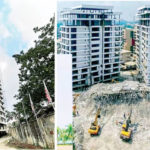As part of efforts to chart a new course on the duty of religious bodies and reinforce what their duties should be in order to shun partisanship and reinforce the importance of freedom of religion or belief (FoRB), the Institute of Church and Society (ICS), an arm of the Christian Council of Nigeria (CCN), last week held a consultative forum with representatives from all religious affiliations.
The meeting which was in furtherance of the mandate of CCN and ICS, to foster peaceful existence among the followers of different faiths in Nigeria while also reorienting stakeholders on their duties and responsibilities, emphasised that FoRB is not objectionable or new as it was provided for under the laws of Nigeria.
The consultative forum which held at the ICS seminar room in Samonda, Ibadan, deliberated on diverse topics including the importance of Freedom of Religion or Belief (FoRB) in a muktu- cultural society like Nigeria, the role of religion in Nigerian Politics, role of Nigeria Inter-Religious Council (NIREC) in promoting national integration and inter- religious harmony in Nigeria using FoRB Roadmap Document.
The forum also deliberated on the role of the National Orientation Agency (NOA) and other relevant public agencies in promoting national integration and inter-religious harmony in Nigeria, role of media in promoting FoRB, national integration and inter-religious harmony in Nigeria as well as general expectations of religious bodies and leaders towards the achievement of peaceful elections.
In his address at the forum, the director of CCN Institute of Church and Society said it is important for every stakeholder and the public in general to be sensitised on the need for everyone to prioritise internalising need for freedom of religion or belief as a criteria for having relative peace in the nation.
He emphasised the fact that freedom of religion or belief is personal, a free will and a human right, adding that no one should be forced to practice any religion while religion should also not be used to bully, stigmatise or deprive anyone of their rights.
He noted that religious extremism is a major challenge in the country as it has caused a lot of crisis in the Nigerian society especially in the socio-political development of the Nigerian society and has eroded public trust in governance and religious leadership.
After deliberations, the forum decided that the first step to take is to stop using the word secular in the Nigerian context as it does not appropriately reflect the diversity of the Nigerian society, advocating that rather than being called a secular state, Nigeria should be refered to as a multi- religious society as despite the fact that it operates a secular constitution that provides for protection of all faith, traditions and belief, the nation continues to experience tension, restrictions and extremism as a result of religious arguments.
The meeting held the consensus that Nigeria must acknowledge FoRB as essential to the liberty of the people and it should be made a priority by government at all levels as a human right as a tool to to curb violence, mediate in conflict and promote peace building.
The participants reiterated the need to embrace FoRB as a guide that will people of different religions and worldview, the basic framework to coexist in mutual respect and understanding while acknowledging and accepting their differences without crisis.
Also, the need for government at all levels to accommodate the practitioners of African Traditional Religion and other recognised religious communities during discourses on religious matters, adding that government at all levels should not be partisan in matters of religion as a practical demonstration of their will to promote peaceful coexistence in the nation.
ALSO READ FROM NIGERIAN TRIBUNE
They charged religious leaders to be worthy models of integrity, modesty, tolerance and selflessness in their public and private lives. Also, religious leaders were cautioned against using inciting and explosive words and comments in the discharge of their duties.
As the fourth estate of the realm saddled with sensitive duties, the media was urged to remain committed to its responsibility as the conscience of the society by ensuring that its reportage of religious matters is professional and devoid of bias.






